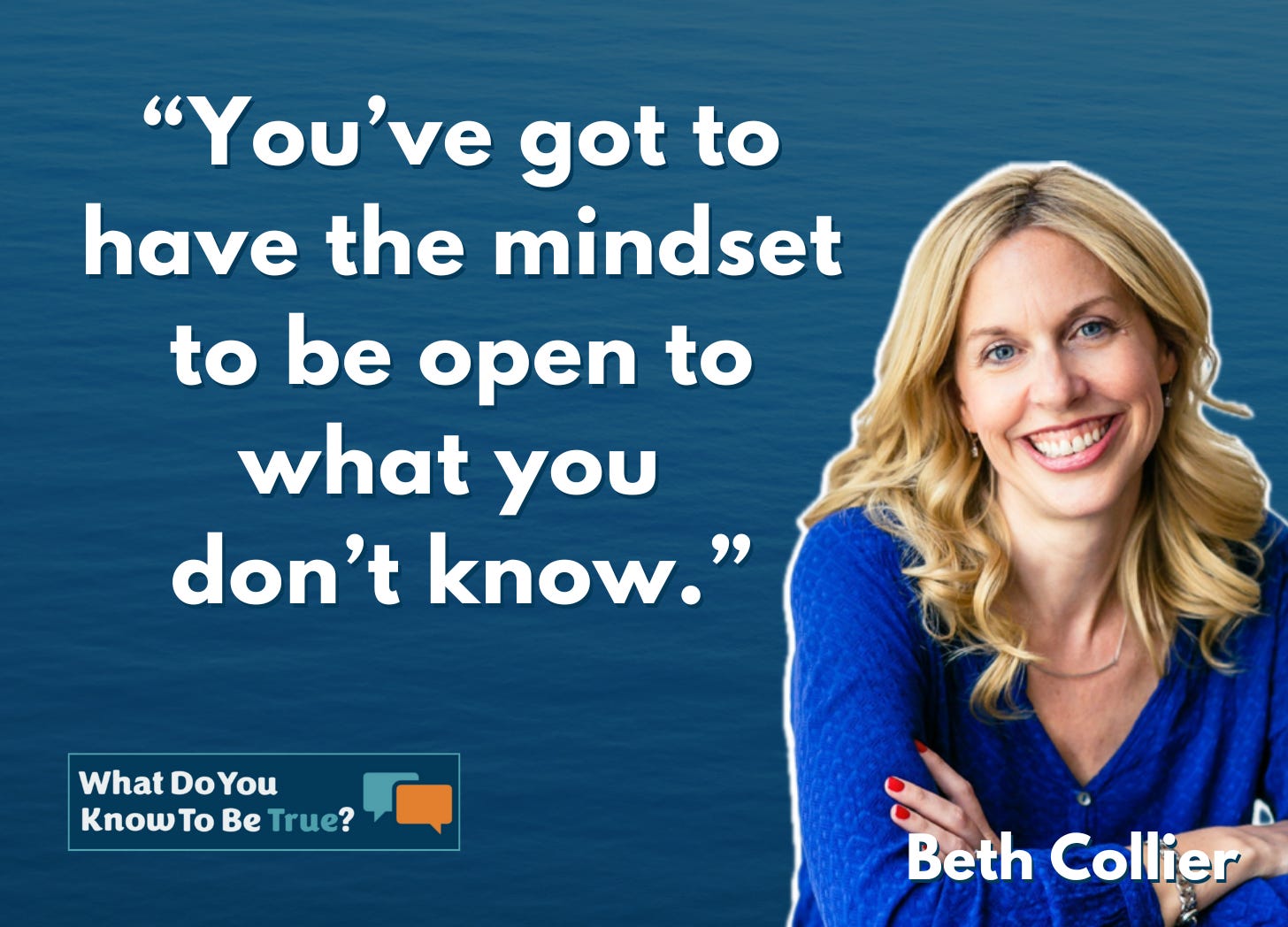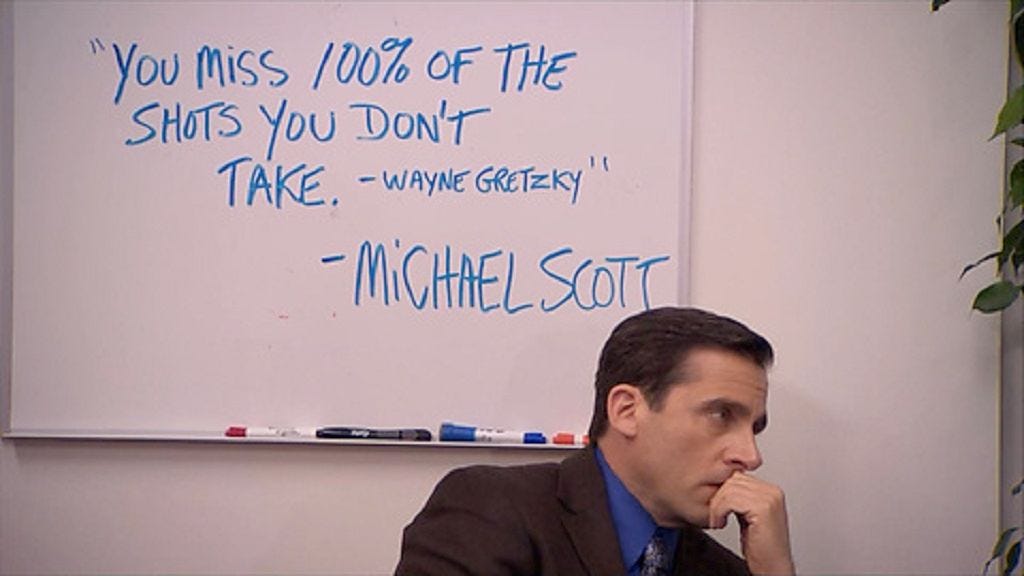The Curious Mind: A Conversation with Beth Collier
Latest Episode Explores Why We Ask, What We Find, And The Surprises Along the Way
Have you ever wondered why some people are deeply curious about so many things?
Why they can’t help but dig deeper, ask more questions, and challenge status quo beliefs that most people accept?
Curiosity isn’t just about gathering information. It’s about uncovering and discovering the truth, even when that truth leads to unexpected or uncomfortable conclusions.
Recently, I had the opportunity to sit down with Beth Collier, author of the Curious Minds Substack newsletter, to explore what makes deeply curious people tick.
If you are curious about curiosity, you’re going to love this conversation.
Beth, a communications expert and consultant, has written many wonderful stories that prove to be a masterclass of her topics. In those articles, she follows her curiosity and crafts stories that take readers on unexpected journeys: sometimes leading to joyful discoveries, other times to disappointing realities.
In our conversation, we unpacked what drives curiosity, the role of critical thinking, and the surprising history behind concepts like imposter syndrome. Here’s what I learned.
Check out the What Do You Know To Be True? podcast episode “Following Your Curiosity to Find Truth and Joy with Beth Collier” available on YouTube, Apple Podcasts, and Spotify.
Curiosity: The Need to Know vs. The Joy of Discovery
At its core, curiosity is about seeking truth. But truth doesn’t always look the way we expect. Sometimes it’s exhilarating, like uncovering a fascinating new truth or connecting dots that others haven’t seen. Other times, it’s frustrating, as in realizing a quote you love was never actually said by the person it’s attributed to, or discovering that a long-held belief is based on misinformation.
Beth’s writing exemplifies the joy and disappointment of discovery. Like Gloria Steinem said (and it’s the title of one of her books, so I think we’re good with this one), “The truth will set you free, but first it will piss you off.”
Every Friday, Beth publishes a new piece that unearths overlooked or misunderstood stories, often with twists and turns that challenge conventional wisdom. One of her guiding principles is the idea that curiosity isn’t just about the pursuit of knowledge, it’s about embracing both the joy and disappointment that can come with it.
“The truth will set you free, but first it will piss you off.” - Gloria Steinem
You’re likely familiar with the concept of confirmation bias, that we tend to like data that supports our world view. By extension, how often do we stop short of asking the next question because we fear the answer might be unsettling?
As Beth says, to be truly curious, “you’ve got to have the mindset to be open to what you don’t know,” and what you might find out.
The Curious Past of Imposter Syndrome
One of the most eye-opening parts of our conversation was Beth’s take on imposter syndrome.
We do go a little longer on this topic, but first, Beth demonstrates her curious mind here in her story of learning more about it. And second, a lot of high performing people experience “the syndrome,” so it felt right to go deep here.
Beth shares that she learned the research on "imposter syndrome" has its roots in a deeply misogynistic past. Originally, it was used to explain why women in professional settings didn’t feel like they belonged, not because they were unqualified, but because they had been systematically excluded from those spaces for so long. Rather than addressing the structural biases that made women feel like imposters, the focus was placed on “fixing” their confidence.
Rather than stigmatizing growth and opportunities, how about we get curious about the strengths we bring and our ability to apply a growth mindset to new roles and opportunities, just like the “old boys” did?
How about getting curious to uncover the claptrap that created the condition that plays on fears? Oh wait, Beth did that.
Maya Angelou Didn’t Say That (And Other Disappointing Truths)
You’ve probably seen this quote attributed to Maya Angelou:
"I've learned that people will forget what you said, people will forget what you did, but people will never forget how you made them feel."
It’s a beautiful sentiment. And yet, Beth discovered that Maya Angelou never said it. This is just one example of how certain ideas take on a life of their own.
I believe it was Lady Gaga who said, “a lie travels around the world before the truth wakes up.” Or, maybe it was Genghis Khan, or the dog from Air Bud.
"I've learned that people will forget what you said, people will forget what you did, but people will never forget how you made them feel." - Unfortunately Not Dr. Maya Angelou
Once something gets repeated enough, it becomes accepted as truth. And in an age where information spreads rapidly over the internet and into our AI, unverified quotes are shared thousands of times before they can be corrected. Curiosity isn’t just a nice-to-have trait, it’s a necessary tool for discovering the truth.
Beth emphasized the importance of media literacy and critical thinking, especially when it comes to the stories we tell ourselves and others. It’s easy to fall into the trap of believing something because it feels true, or because we want it to be true. But if we really value curiosity, we have to be willing to ask the question, “is it true?” Even the things that confirm our existing beliefs.
The Path Forward: Cultivating a Curious Mind
So, how can we all become more curious in a way that leads to deeper understanding rather than just accumulating trivia?
Beth offered a few insights:
Ask better open-ended questions. Instead of stopping at “What happened?” ask “Why did this happen?” And follow that up with another “Why is that?” question. Keep going.
Challenge your assumptions. When you feel certain about something, take a moment to ask yourself how you know it’s true. Ask yourself, “what would need to be true for my assumption/belief to not be true?”
Be open to not knowing. Curiosity isn’t about proving yourself right. It’s about discovering the truth, especially when it contradicts your expectations.
Follow the story wherever it leads. As Beth says, “Not every story will have a happy ending,” but with persistence and critical thinking, it will be a true story.
If you want to sharpen your curiosity and uncover new ways of thinking, I highly recommend checking out Beth’s Curious Minds newsletter on Substack.
If this conversation sparked any new questions for you, I’d love to hear them. What are you most curious about right now?
And remember, “The truth will set you free, but first it may piss you off.” – Michael Scott
Be sure to check out the What Do You Know To Be True? podcast episode “Following Your Curiosity to Find Truth and Joy with Beth Collier” available on YouTube, Apple Podcasts, and Spotify.
Hi, I’m Roger Kastner. I’ve been working with individuals and teams for over 25 years to design new ways of thinking, behaving, and working to unlock challenges, achieve goals, and live into their potential and possible selves.
The What Do You Know To Be True? podcast is a series of conversations with Ordinary People with Extraordinary Talent making meaningful impact in the world.
In these conversations, we explore our guests' experience with their superpower and how they unlock more of their possibilities. The goal is to be inspired to think more deeply about our potential and our possibilities, and how we can create a positive impact in our world.
The podcast is available on YouTube, Apple, Spotify, and all the usual places.






I wonder how many people will be crediting Michael Scott for his inspirational quotes...